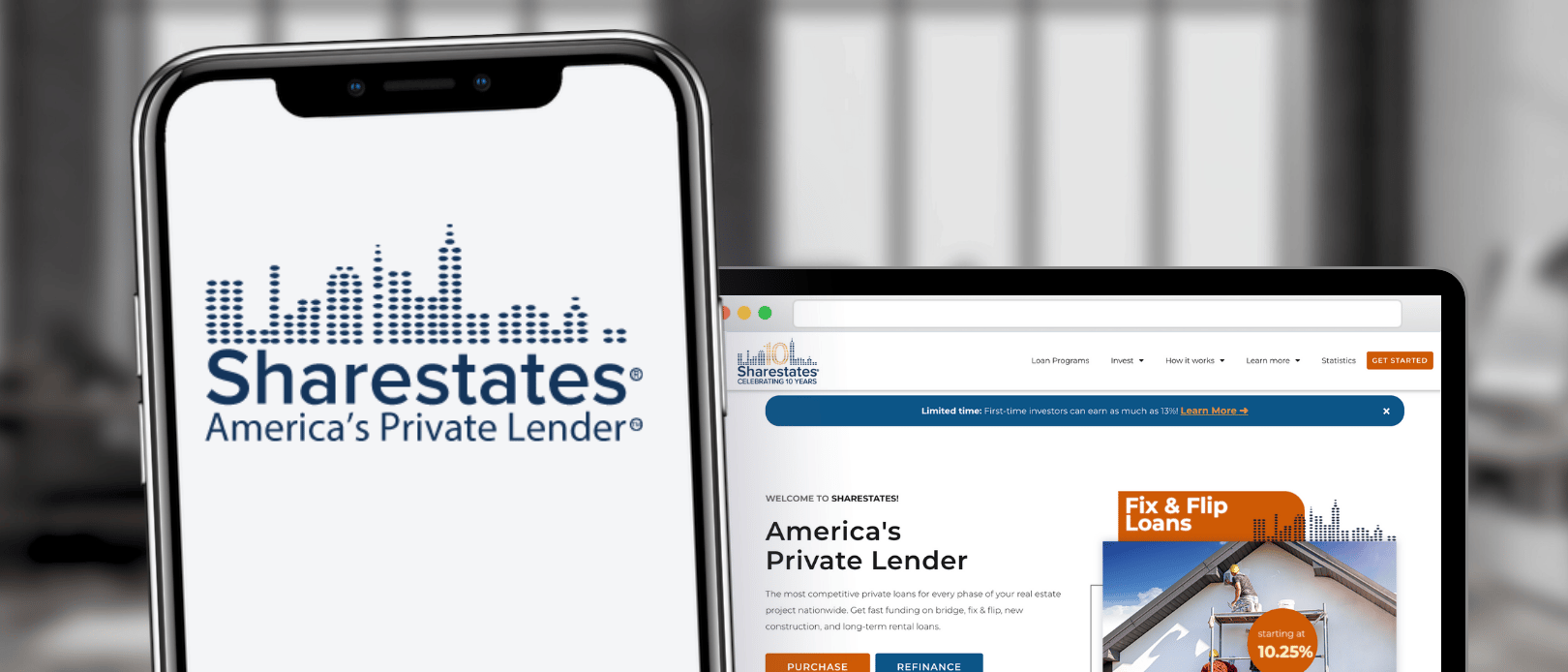
Sharestates review: Crowdfunding real estate investing
Moneywise.com / Moneywise.com
Updated: January 02, 2024
We adhere to strict standards of editorial integrity to help you make decisions with confidence. Please be aware that some (or all) products and services linked in this article are from our sponsors.
We adhere to strict standards of editorial integrity to help you make decisions with confidence. Please be aware that some (or all) products and services linked in this article are from our sponsors.
Have you ever wanted to invest in an apartment building or retail space in a hot new neighborhood but couldn't? The problem generally starts with access to the opportunity, or lack thereof, and ends with the large minimum investment required.
Real estate crowdfunding allows investors to become one of a pool of people and companies that provide funds to purchase or rehab property. Instead of being limited to investing in properties that depend solely on your personal financial resources, you become one of many investors who come together to invest in vetted property deals. And rather than being limited to purchasing residential real estate, crowdfunding gives you an opportunity to enter the more lucrative commercial real estate market.
Crowdfunded real estate investment was made possible by the Jumpstart Our Business Startups (JOBS) Act. Passed in 2012, the act allowed the SEC to write new rules for funding businesses to allow crowdsourced funding. The act removed some of the restrictions that limited how businesses are able to fund activities and made it less burdensome to secure funding.
Sharestates features
| Feature | Details |
|---|---|
| Minimum investment | $1,000 |
| Account fees | 0-2% setup fee |
| Time commitment | 6 Months |
| Accreditation required | ✅ |
| Private REIT | ❌ |
| Offering types | Debt, Equity, Preferred Equity |
| Property types | Commercial, Residential, Single Family, Foreign Investors |
| Regions served | AL, AK, AZ, CA, CO, CT, DC, DE, FL, GA, HI, IA, ID, IL, IN, KS, KY, LA, MA, MD, ME, MI, MN, MO, MS, MT, NC, NE, NH, NJ, NM, NY, OH, OK, OR, PA, RI, SC, TN, TX, UT, VA, VT, WA, WI, WV and WY |
| Secondary market | ❌ |
| Self-Directed IRA | ✅ |
| 1031 exchange | ❌ |
| Pre-vetted | ✅ |
| Pre-funded | ✅ |
REITs vs Real estate crowdfunding
With a crowd-funded platform, you get detailed information about — and access to invest in — specific real estate properties. It’s less involved than buying property outright and becoming a landlord but more hands-on than investing in a REIT (real estate investment trust).
If you are familiar with commercial real estate, then you are aware crowdfunding is not a new way to finance real estate investments. REITs have been used for years to finance the purchases of large portfolios of commercial properties. The difference between REITs and today's crowd-funded real estate investment is control and transparency. Real estate crowdfunding platforms like Sharestates allow you to pick specific individual properties to invest in and make all property information available to its investors.
Real estate crowdfunding is more hands-on than investing through a REIT, in that the individual investor chooses which specific properties to invest in, but not as hands-on as buying individual properties yourself.
REITs are blind pools of investment properties with little transparency, and they generally carry high fees. Public REITs are traded like stocks and are therefore subject to the volatility of the market. In real estate crowdfunding, your risk is more localized and not correlated with the global equity markets.
Sharestates was founded by real estate professionals, Raymond Y. Davoodi and Radni Davoodi, and Allen Shayanfekr, a securities attorney and real estate investor. Their service delivers on their corporate mission:
We believe everyone should be able to invest in real estate. We challenged ourselves to come up with a solution that could give everyday investors a chance to access those inaccessible real estate investments at a fraction of the investment minimum.
| Highlights | Sharestates | RealtyMogul |
|---|---|---|
| Rating | 4/5 | 4.5/5 |
| Minimum investment | $1,000 | $5,000 |
| Account fees | 0-2% setup fee | 1-1.25%/year asset management fee |
| Private REIT | ❌ | ✅ |
| - | - | SIGN UP |
How does Sharestates work?
Sharestates provides a platform for two parties: a sponsor and an investor. A sponsor can be a real estate developer, a real estate rehabilitator, or any other non–owner occupied property investor looking for funding.
You the investor view the investment opportunities, pick one you like, read the offering materials, and purchase your Notes or Membership Units. After your purchase, you can keep track of your investment and receive updates for the property through your investor portfolio. You can link a bank account and withdraw funds when distributions are made. You can even decide to reinvest your distributions through your investment portfolio and keep growing your investment faster.
There are two types of investments available at Sharestates. “Borrower payment dependent notes” are a debt security directly linked to the performance of a corresponding project investment. Debt Funding allows you to loan money to the sponsor/developer in exchange for a percentage return. Projects are offered as either senior secured debt with an expected net return between 10 percent and 14 percent or mezzanine level debt with an expected return of 10 percent to 16 percent. Investors receive distributions and interest payments, typically in the form of monthly payments, plus a balloon payment of interest plus principal at the end of the project term.
The second investment type is Equity Funding, which comes in the form of Membership Units. In essence you will own a piece or slice of the subject property. When you purchase a Membership Unit in an LLC, you're purchasing rights to a portion of that company. Accordingly, you’ll be entitled to a share of the profits and losses attributable to that company. You can make a profit if the project sells for more than it was worth when you paid for it.
In some cases, equity projects will deliver an “End of Term” return. Those projects are usually development projects that require sale of the asset before making distributions. In other cases, equity projects will deliver monthly distributions and a balloon payment at the end of the project when the asset is sold.
Much like preferred shares in stock investments, some project investments will designate a certain percentage return as a “preferred return.” In effect, this gives your class of Membership Units a step up in priority — resulting in distributions first, before a regular equity partner.
Sharestates puts each deal through a 34-point underwriting process. There are nine main underwriting categories for each deal: LTV (loan-to-value) Ratio, Lien Position, Location, Occupancy, Development Phase, Sponsor’s Track Record, Sponsor’s Experience, Sponsor’s Credit Score and Sponsor’s Personal Guarantee. If the deal successfully passes the underwriting process, a rating is determined for the deal, which translates to a suggested interest rate the deal should receive.
Risk and reward
It’s clear Sharestates is in this business for the long term. With a focus on delivering a lower-risk investment by keeping the LTV (loan-to-value ratio) less than 80 percent and the ratio of the loan amount to the ARV (after-repair value) below 65 percent, Sharestates chooses to underwrite only about 2 percent of the deals brought to them.
Institutions are a big slice of the current investor pool, which means individuals are investing side-by-side with experienced analysts who’ve also vetted the deals. Each deal is set up as a separate project and transparency allows investors to know exactly what they’re purchasing; contracts, title searches, property comps, financial statements, binding term sheets and all other relevant documents are linked to each property for easy and convenient review. Additionally, Sharestates monitors project process, including requiring expense signoffs. The underwriting process and rating baseline for each project is completely transparent.
As with any investment, there is a risk of loss. To date, Sharestates had zero loss of principal on their projects. As great a track record as that is, VP, Capital Markets Kevin Shane added, “While we strive to keep our underwriting standards high, it’s inevitable that, with scalable growth, some losses will eventually occur.”
Sharestates is committed to developing long-term relationships with their customers and follows strict underwriting criteria before approving a sponsor or a project. If a sponsor defaults on a loan, then Sharestates may pursue foreclosure. Any money recovered through foreclosure (after legal expenses) will be distributed to investors. For a preferred or common equity deal, Sharestates may seek judicial relief for damages.
Additionally, investors have protection if Sharestates goes out of business. Sharestates uses a remote bankruptcy structure to safeguard investor assets. If Sharestates goes out of business, a backup service provider would be appointed to service any outstanding projects from the platform. The project investments are made through special-purpose entities, which are restricted from taking on any form of debt not related to the corresponding projects.
Currently, Sharestates has funded more deals than any other self-funded site. Their deal composition is a mix of asset classes: residential (30 percent), multi-family (35 percent), with the remaining 35 percent being a combination of hospitality, mixed-use, and retail.
Pros and cons
Pros
- Vetted by real estate professionals
- Secured escrow account
- Due diligence
- Transparency
- Short-term investments
- Low minimum
- Cheaper than REITs
Cons
- Accredited investor
- No secondary market
Summary
Crowdfunding real estate sites are popping up almost daily. Providing access to deals previously unavailable to the individual investor is a huge benefit of these platforms. Sharestates offers access to a large volume of quality deals. Their transparency, as well as their commitment to choosing deals with conservative financials from sponsors with proven track records, shows their commitment to being around for the long term.





